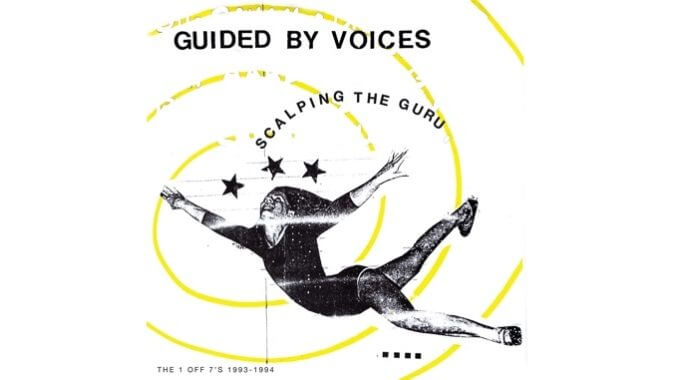Scalping the Guru Collects Hard-to-Find Nuggets from Guided by Voices’ Golden Era

It may take a hospital bed for Guided by Voices bandleader and never-ending wellspring of melody Robert Pollard to stop releasing albums. Though, given his preternatural ability to churn out gold with even the most dodgy dime-store equipment available to him, it’s likely he would create a pop opus only using his bedpan and a four-track recorder. In the nearly 40 years he’s been making music with the band and his various solo projects, he’s released music at such a prolific rate that his name and the GBV moniker are both used as shorthand for getting music out quickly. He’s stated in interviews that looking back on certain eras of the band isn’t necessarily one of his favorite things to do. But with the release of this brand new collection of tracks from various EPs released during their early-’90s “classic lineup” heyday, aptly titled Scalping the Guru, fans are given a reminder of Pollard’s unstoppable drive to create before the band reached their status as one of the great indie-rock groups of all time.
The bottom line is, recording an album can be as much of a money trap as buying a fixer-upper or hunting down the remaining cans of Surge still available on eBay. Learning and perfecting your own songs for an audience is one thing. But to capture the magic on record in the early stages of a band, you need to develop the resourcefulness of a gang of shoplifters picking and choosing which candy bars they can hide underneath their shirts without security noticing. In the early days of the band, Pollard knew that it would take a village—or at least a sizable bank loan—to get his music out into the world.
While he started the project in the early ’80s after the dissolution of his heavy metal cover band Anacrusis, Guided by Voices had released several albums that were only heard by Pollard’s local drinking buddies around Dayton, Ohio. But with a family to support and mounting pressure from his parents to hang up his dreams as college radio’s Pete Townshend, Pollard kept his focus on his work as a public elementary school teacher. The story goes that with the band not really catching on with the local scene in Dayton, Pollard took out a loan from his local teacher’s union to fund the recording and pressing of some of the band’s now-revered lo-fi classics. A true DIY enterprise, the band recorded at a near-constant rate on a four-track recorder, giving Pollard’s British Invasion-inspired pop anthems a recognizable warble and amateurish charm, much like their distant peers The Clean and Cleaners From Venus. This ramshackle, homespun quality to Pollard and co.’s early-’90s output—as well as their shockingly high ratio of bangers per release—is what made them such a profound revelation amidst a field of indie rockers who were getting more and more pretentious the more a spotlight shined on the scene.
Even though albums like Propeller, Vampire on Titus, and their classic 1994 breakthrough Bee Thousand were stuffed wall-to-wall with beer-soaked anthems, it was unmistakably clear that these records were being pumped out by weekend warriors. In fact, upon the release of Bee Thousand, Pollard was nearing his punk rock expiration date at the ancient age of 37. In between those full-lengths, the band had superglued the record button down to create a series of EPs. For Scalping the Guru, Pollard hand-selected a greatest hits culled from four of these fan-favorite and hard-to-find releases from 1993 and 1994—Static Airplane Jive, Get Out of My Stations, Fast Japanese Spin Cycle and Clown Prince of the Menthol Trailer.
Like Bee Thousand and Alien Lanes, Scalping the Guru’s sequencing takes on a very scattershot, kaleidoscopic feel, delivering 20 songs in just over a half an hour. The collection is a must for longtime fans who have logged countless hours trying to nab original copies of these EPs on Discogs—needless to say, the Venn diagram of GBV fans and people who have that website bookmarked is just one big circle. But while the band’s ever-growing discography might scare some away—they’ve released two records this year alone—this collection can sit along any of their most revered long-players. The leadoff track “Matter Eater Lad” is a prime intro candidate into GBV’s world, as you can hear Pollard’s “F’s” and “S’s” hitting the microphone without a pop filter in the verses before it launches into its high-kicking garage-rock hook.
-

-

-

-

-

-

-

-

-

-

-

-

-

-

-

-

-

-

-

-

-

-

-

-

-

-

-

-

-

-

-

-

-

-

-

-

-

-

-

-








































